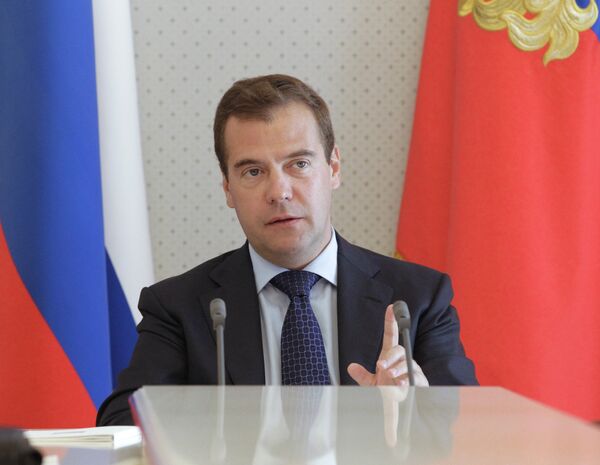On September 1, President Dmitry Medvedev heads to the Tajik capital of Dushanbe for an intensive three-day visit. He will hold official tete-a-tete talks with his Tajik counterpart Emomali Rakhmon, attend a presidential meeting with the heads of Afghanistan, Pakistan and Tajikistan and, finally, join the CIS anniversary summit.
This year, the CIS turns 20, and it's looking shabby for its years. Most people in the CIS do not understand this bureaucratic organization's mission at all. It is more a discussion club than a coordinating body. But at the same time, CIS countries share a number of common problems across the region, including Afghanistan.
Afghan bid to join CIS
Combat action in Afghanistan and the continuing destabilization in Pakistan are creating tensions in Central Asia and Russia. The problem is not simply drug trafficking. Afghan militants could potentially break into the CIS territory. Medvedev will discuss these issues with his Afghan, Pakistani and Tajik colleagues on September 2-3.
Afghanistan is a time-bomb for the region. The withdrawal of the NATO coalition troops is bound to escalate tensions and could make developments unpredictable.
As of 2008, Kabul has expressed an interest in joining the CIS as a full-fledged member. Afghan representatives have already participated in the CIS Inter-Parliamentary Assembly's sessions in St. Petersburg without a right to vote.
Indeed, it is clear what Kabul would gain from joining the CIS as this would automatically lead to transport infrastructure development, CIS investments for the Afghan economy and military and technical cooperation. But does the CIS need more problems given its present instability? Kabul's bid to join the CIS is unlikely to be endorsed in the mid-term. However, the CIS could soon be forced to intensify its cooperation with Afghanistan, above all in military and security areas.
Who won't attend the summit and why
Uzbek President Islam Karimov has already stated that he will not attend the CIS anniversary summit in Dushanbe on Sept. 2-3. Instead, Prime Minister Shavkat Mirziyev will represent Uzbekistan at the summit.
Karimov also refused to take part in the presidential summit of the Collective Security Treaty Organization (CSTO) in Astana several weeks ago.
Generally speaking, the Uzbek president has rarely participated in major CIS events at the interstate and regional level in the past few years. Journalists have traditionally referred to his disappearing act as a "conspicuous absence." By not attending, Karimov demonstrates his disappointment with integration projects initiated by Russia in the post-Soviet space.
In the past few months - given the withdrawal of the NATO troops from Afghanistan - Uzbekistan has considered returning U.S. military bases to the country. Apparently, Karimov links Uzbek security not with the CIS or CSTO, but rather with U.S. military assistance.
Azerbaijani President Ilham Aliyev also will not attend the summit. Baku is openly displeased with the position of the CIS - and primarily Russia's stance - on the Nagorny-Karabakh conflict. The demarche is surprising, as both Russia and the CIS as a whole have repeatedly supported Azerbaijan's territorial integrity. As of 1992, the CIS has repeatedly acted as a mediator in settling the conflict and its withdrawal from the negotiations will not lead to a compromise.
CIS as commonwealth of nations
Despite all the justified criticism of the CIS, it still remains the only integration association to incorporate most former Soviet Union republics. There is no point renouncing its achievements over the past 20 years, such as visa-free travel. But free movement also has a reverse side in illegal migration. In this context, the summit's participants plan to adopt a program to counter illegal migration in 2012-2014.
On the whole, the future of the CIS will depend on the CIS Executive Committee's ability to offer real projects to CIS countries, whose implementation will increase their living standards and make their economies more competitive.
Ultimately, the CIS may become an analogue of the British Commonwealth, which is formally the largest inter-state association in the world, albeit one without any real power. Its primary emphasis is sports and cultural projects.
Little time remains to re-launch the CIS. CIS countries plan to form the Eurasian Union on the basis of the Customs Union and Common Economic Space of the EurAsEC in 2012. This union will most likely define further post-Soviet integration. In its present form, the CIS is unlikely to be able to compete with a potentially powerful Eurasian Union.
Failed confederation
Few people remember that the heads of Russia, Ukraine and Belarus first spoke about the CIS as a confederation that would preserve a common economic and information space, as well as a common currency.
The Alma Ata declaration of December 21, 1991 made special mention of a common CIS defense policy and control over nuclear weapons.
However, it soon became clear that the CIS was more an instrument for a peaceful divorce of the former Soviet republics than an efficient integration association.
Each CIS country started conducting its own policy in economy, defense, security, international relations and other spheres. Although the CIS adopted numerous programs, concepts and agreements, the preponderant majority of them remained on paper.
As of summer 2010, the EurAsEC integration project - the Customs Union - began to gain momentum in the post-Soviet space. Now, Russia, Belarus and Kazakhstan are members, but it is also open to new participants. Its formation has questioned the need to re-launch a free-trade zone in the CIS, a project which the CIS Executive Committee has worked on over the past few years.
De facto, post-Soviet economic integration issues are increasingly falling within the competence of EurAsEC.
Innokenty Adyasov is a leading consultant on the expert council of the State Duma Committee for CIS Affairs.
The views expressed in this article are the author's and may not necessarily represent those of RIA Novosti.



